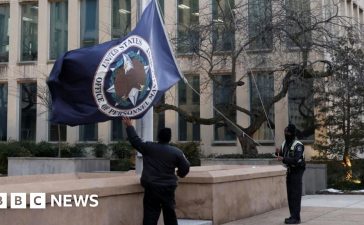The union representing actors in the US film, TV, and radio industries has turned down the latest contract offer from studios in its battle to regulate the entertainment sector’s use of AI.
SAG-AFTRA, short for the Screen Actors Guild-American Federation of Television and Radio Artists, has been locked into negotiations with the Alliance of Motion Picture and Television Producers (AMPTP) for months. Despite the prolonged back-and-forth discussions, the two sides have failed to reach much common ground so far.
“This morning, our negotiators formally responded to the AMPTP’s ‘Last, Best, & Final’ offer,” SAG-AFTRA declared in a statement posted on Twitter. “There are several essential items on which we still do not have an agreement, including AI,” it states.
AI is a particularly thorny issue for performers in the entertainment industry. Top actors and actresses, such as Scarlett Johannson and Tom Hanks, have criticized adverts featuring, without permission, copies of their faces and voices manipulated by AI. Needless to say, they didn’t get paid for them, either.
Actors are concerned about the rising possibilities of TV and film studios scanning their likeness to create digital AI-powered replicas that can be animated and used over and over in different scenes and productions, leaving the humans out of work. Studios could, in theory, craft deepfakes of people for all sorts of applications – such as creating extras in background shots or voiceovers – without having to hire and rehire people to perform in the real world.
AMPTP reportedly wants to be able to subject Schedule F workers – who earn more than the minimum wage for regular actors and actresses per episode in TV shows ($32,000) or a significant role in a feature film ($60,000) – to these AI scans. The trade association, representing over 350 American television and film production companies, is willing to pay the actors for the scans. But SAG-AFTRA also wants compensation for its members every time those images are reused, according to The Hollywood Reporter.
Another issue hindering negotiations is consent. SAG-AFTRA believes entertainment studios should obtain explicit consent for AI use – not only from living performers, but also from estates representing deceased thespians. One source, talking to the Reporter, claimed that the language in the AMPTP’s latest contract offer would give studios the ability to forge AI deepfakes of dead actors and actresses without permission from their estates.
“This is one of the biggest reasons SAG did not accept the ‘last, best and final’ offer from the AMPTP. We could not allow that language to stand,” the anonymous source on SAG-AFTRA’s side reportedly argued.
“We think it’s not just reasonable but is absolutely vital to the sustainability of the performance industry,” they added. “They can’t have that loophole to exploit performers. … [The Schedule F AI language in the AMPTP’s proposal] behooves them to have you dead, in that they need consent when you’re alive but not when you’re dead.”
In September, members of the Writers Guild of America ended their 148-day strike with TV and film studios by agreeing to a new contract with the AMPTP. The guild, representing tens of thousands of writers, successfully fought to increase wages, and restrict the studios’ use of generative AI technology to create or edit text for scripts.
The Register has asked SAG-AFTRA and AMPTP for further comment. ®












